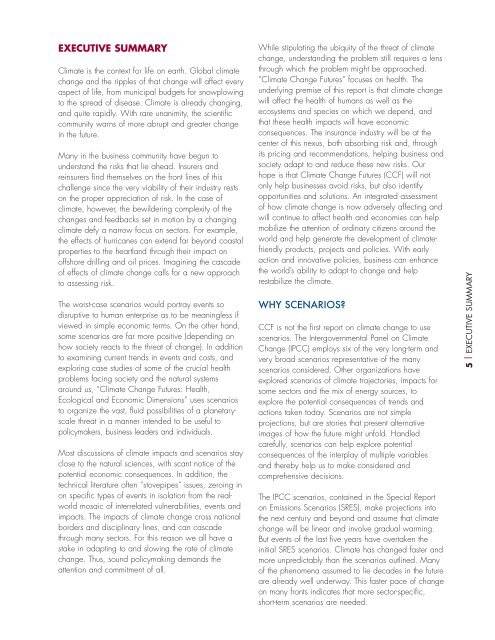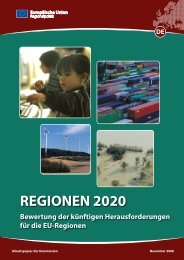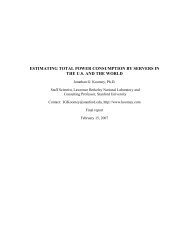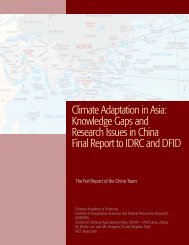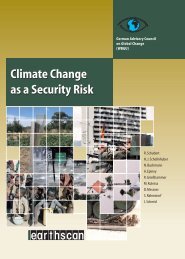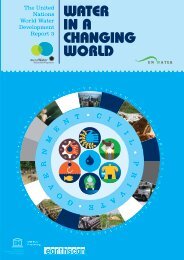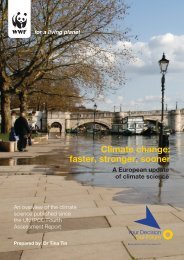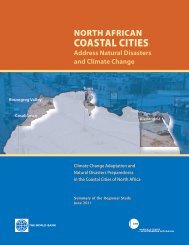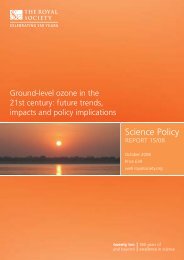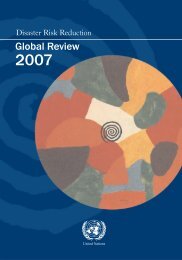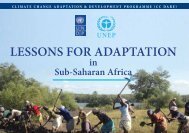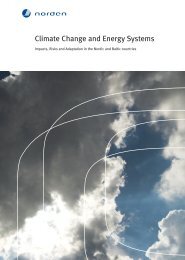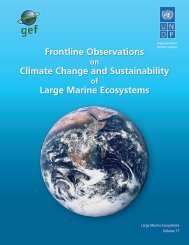EXECUTIVE SUMMARY<strong>Climate</strong> is the context for life on earth. Global climate<strong>change</strong> <strong>and</strong> the ripples of that <strong>change</strong> will affect everyaspect of life, from municipal budgets for snowplowingto the spread of disease. <strong>Climate</strong> is already changing,<strong>and</strong> quite rapidly. With rare unanimity, the scientificcommunity warns of more abrupt <strong>and</strong> greater <strong>change</strong>in the future.Many in the business community have begun tounderst<strong>and</strong> the risks that lie ahead. Insurers <strong>and</strong>reinsurers find themselves on the front lines of thischallenge since the very viability of their industry restson the proper appreciation of risk. In the case ofclimate, however, the bewildering complexity of the<strong>change</strong>s <strong>and</strong> feedbacks set in motion by a changingclimate defy a narrow focus on sectors. For example,the effects of hurricanes can extend far beyond coastalproperties to the heartl<strong>and</strong> through their impact onoffshore drilling <strong>and</strong> oil prices. Imagining the cascadeof effects of climate <strong>change</strong> calls for a new approachto assessing risk.The worst-case scenarios would portray events sodisruptive to human enterprise as to be meaningless ifviewed in simple <strong>economic</strong> terms. On the other h<strong>and</strong>,some scenarios are far more positive (depending onhow society reacts to the threat of <strong>change</strong>). In additionto examining current trends in events <strong>and</strong> costs, <strong>and</strong>exploring case studies of some of the crucial <strong>health</strong>problems facing society <strong>and</strong> the natural systemsaround us, “<strong>Climate</strong> Change Futures: Health,Ecological <strong>and</strong> Economic Dimensions” uses scenariosto organize the vast, fluid possibilities of a planetaryscalethreat in a manner intended to be useful topolicymakers, business leaders <strong>and</strong> individuals.Most discussions of climate impacts <strong>and</strong> scenarios stayclose to the natural sciences, with scant notice of thepotential <strong>economic</strong> consequences. In addition, thetechnical literature often “stovepipes” issues, zeroing inon specific types of events in isolation from the realworldmosaic of interrelated vulnerabilities, events <strong>and</strong>impacts. The impacts of climate <strong>change</strong> cross nationalborders <strong>and</strong> disciplinary lines, <strong>and</strong> can cascadethrough many sectors. For this reason we all have astake in adapting to <strong>and</strong> slowing the rate of climate<strong>change</strong>. Thus, sound policymaking dem<strong>and</strong>s theattention <strong>and</strong> commitment of all.While stipulating the ubiquity of the threat of climate<strong>change</strong>, underst<strong>and</strong>ing the problem still requires a lensthrough which the problem might be approached.“<strong>Climate</strong> Change Futures” focuses on <strong>health</strong>. Theunderlying premise of this report is that climate <strong>change</strong>will affect the <strong>health</strong> of humans as well as theecosystems <strong>and</strong> species on which we depend, <strong>and</strong>that these <strong>health</strong> impacts will have <strong>economic</strong>consequences. The insurance industry will be at thecenter of this nexus, both absorbing risk <strong>and</strong>, throughits pricing <strong>and</strong> recommendations, helping business <strong>and</strong>society adapt to <strong>and</strong> reduce these new risks. Ourhope is that <strong>Climate</strong> Change Futures (CCF) will notonly help businesses avoid risks, but also identifyopportunities <strong>and</strong> solutions. An integrated assessmentof how climate <strong>change</strong> is now adversely affecting <strong>and</strong>will continue to affect <strong>health</strong> <strong>and</strong> economies can helpmobilize the attention of ordinary citizens around theworld <strong>and</strong> help generate the development of climatefriendlyproducts, projects <strong>and</strong> policies. With earlyaction <strong>and</strong> innovative policies, business can enhancethe world’s ability to adapt to <strong>change</strong> <strong>and</strong> helprestabilize the climate.WHY SCENARIOS?CCF is not the first report on climate <strong>change</strong> to usescenarios. The Intergovernmental Panel on <strong>Climate</strong>Change (IPCC) employs six of the very long-term <strong>and</strong>very broad scenarios representative of the manyscenarios considered. Other organizations haveexplored scenarios of climate trajectories, impacts forsome sectors <strong>and</strong> the mix of energy sources, toexplore the potential consequences of trends <strong>and</strong>actions taken today. Scenarios are not simpleprojections, but are stories that present alternativeimages of how the future might unfold. H<strong>and</strong>ledcarefully, scenarios can help explore potentialconsequences of the interplay of multiple variables<strong>and</strong> thereby help us to make considered <strong>and</strong>comprehensive decisions.The IPCC scenarios, contained in the Special Reporton Emissions Scenarios (SRES), make projections intothe next century <strong>and</strong> beyond <strong>and</strong> assume that climate<strong>change</strong> will be linear <strong>and</strong> involve gradual warming.But events of the last five years have overtaken theinitial SRES scenarios. <strong>Climate</strong> has <strong>change</strong>d faster <strong>and</strong>more unpredictably than the scenarios outlined. Manyof the phenomena assumed to lie decades in the futureare already well underway. This faster pace of <strong>change</strong>on many fronts indicates that more sector-specific,short-term scenarios are needed.5 | EXECUTIVE SUMMARY
6 | EXECUTIVE SUMMARYWith this in mind, the CCF scenarios are designedto complement the far-reaching IPCC framework.Drawing upon the full-blown, long-term scenariosoffered by the IPCC, we have developed twoscenarios that highlight possibilities inadequatelyconsidered in past assessments of climate <strong>change</strong>impacts.Both CCF scenarios envision a climate context of gradualwarming with growing variability <strong>and</strong> more weatherextremes. Both scenarios are based on “business-asusual,”which, if unabated, would lead to doubling ofatmospheric CO 2from pre-industrial values by midcentury.Both are based on the current climate trends forsteady warming along with an increase in extremes,with greater <strong>and</strong> costlier impacts. The compilation ofextreme weather events of all types shows a clearincrease over the past decade in the number ofextremes occurring in both hemispheres (see figurebelow).Overall costs from catastrophic weather-related eventsrose from an average of US $4 billion per year duringthe 1950s, to US $46 billion per year in the 1990s,<strong>and</strong> almost double that in 2004. In 2004, the combinedweather-related losses from catastrophic <strong>and</strong>small events were US $107 billion, setting a newrecord. (Total losses in 2004, including non-weatherrelatedlosses, were US $123 billion; Swiss Re2005a). With Hurricanes Katrina <strong>and</strong> Rita, 2005had, by September, broken all-time records yet again.Meanwhile, the insured percentage of catastrophiclosses nearly tripled from 11% in the 1960s to 26% inthe 1990s <strong>and</strong> reached 42% (US $44.6 billion) in2004 (all values inflation-corrected to 2004 dollars;Munich Re NatCatSERVICE).As an insurer of last resort, the US Federal EmergencyManagement Agency has experienced escalatingcosts for natural disasters since 1990. Moreover, inKEY POINTS1. Warming favors the spread of disease.2. Extreme weather events create conditions conduciveto disease outbreaks.3. <strong>Climate</strong> <strong>change</strong> <strong>and</strong> infectious diseases threatenwildlife, livestock, agriculture, forests <strong>and</strong> marinelife, which provide us with essential resources <strong>and</strong>constitute our life-support systems.4. <strong>Climate</strong> instability <strong>and</strong> the spread of diseases arenot good for business.5. The impacts of climate <strong>change</strong> could increaseincrementally over decades.6. Some impacts of warming <strong>and</strong> greater weathervolatility could occur suddenly <strong>and</strong> become widespread.7. Coastal human communities, coral reefs <strong>and</strong>forests are particularly vulnerable to warming <strong>and</strong>disease, especially as the return time betweenextremes shortens.8. A more positive scenario is that climate reachesa new equilibrium, allowing a measure of adaptation<strong>and</strong> the opportunity to rapidly reduce the globalenvironmental influence of human activities,namely fossil fuel combustion <strong>and</strong> deforestation.9. A well-funded, well-insured program to develop<strong>and</strong> distribute a diverse suite of means to generateenergy cleanly, efficiently <strong>and</strong> safely offers enormousbusiness opportunities <strong>and</strong> may present themost secure means of restabilizing the climate.10. Solutions to the emerging energy crisis must be throroughlyscrutinized as to their life cycle impacts on<strong>health</strong> <strong>and</strong> safety, environmental integrity, globalsecurity <strong>and</strong> the international economy.Extreme Weather Events by RegionNumber of Events500400300200100South AmericaOceaniaEuropeAfricaNorth America(including Caribbean, Central America)Asia (including Russia)0Year7579 83 87 91 95 99 02These data are taken from EMDAT (Emergency Events Database) from 1975 to 2002. Compiled by the Center for Research on the Epidemiologyof Disasters (CRED) at the Universite-Catholique de Louvain in Brussels, Belgium, this data set draws from multiple disaster relief organizations(such as OFDA <strong>and</strong> USAID), <strong>and</strong> is therefore skewed toward events that have large human impacts. The data taken from EMDAT were createdwith the initial support of WHO <strong>and</strong> the Belgian government.
- Page 1 and 2: Climate Change FuturesHealth, Ecolo
- Page 4 and 5: Table of ContentsIntroductionPart I
- Page 8 and 9: the past decade, an increasing prop
- Page 10 and 11: THE CASE STUDIES IN BRIEFInfectious
- Page 12 and 13: THE INSURER’S OVERVIEW:A UNIQUE P
- Page 14: Regulators and governments can empl
- Page 17 and 18: THE PROBLEM:CLIMATE IS CHANGING, FA
- Page 19 and 20: Figure 1.3 GreenlandEXTREMESOne of
- Page 21 and 22: 20 | THE CLIMATE CONTEXT TODAYWholl
- Page 23 and 24: Figure 1.5 Global Weather-Related L
- Page 25 and 26: Climate signals in rising costs fro
- Page 27 and 28: CLIMATE CHANGE CANOCCUR ABRUPTLYPer
- Page 29 and 30: 28 | THE CLIMATE CONTEXT TODAYCCF-I
- Page 31 and 32: communities, salinizing ground wate
- Page 33 and 34: Health is the final common pathway
- Page 35 and 36: 34 | INFECTIOUS AND RESPIRATORY DIS
- Page 37 and 38: Figure 2.4 Malaria and Floods in Mo
- Page 39 and 40: Figure 2.61920-1980CASE STUDIES38 |
- Page 41 and 42: A MALARIA SUCCESSThe New York Times
- Page 43 and 44: A new flavivirus, Usutu, akin to WN
- Page 45 and 46: 44 | INFECTIOUS AND RESPIRATORY DIS
- Page 47 and 48: One analysis (Vanderhoof and Vander
- Page 49 and 50: BIODIVERSITYBUFFERS AGAINSTTHE SPRE
- Page 51 and 52: Figure 2.15 RagweedMOLDSLong-term f
- Page 53 and 54: ASTHMA COSTSTODAYexamples, the Afri
- Page 55 and 56: Stott et al. (2004) calculate that
- Page 57 and 58:
In the summer of 2005, northern Spa
- Page 59 and 60:
a better understanding of subpopula
- Page 61 and 62:
60 | EXTREME WEATHER EVENTSFLOODSFO
- Page 63 and 64:
MOSQUITO- AND SOIL-BORNE DISEASESEC
- Page 65 and 66:
Table 2.2 Direct and Indirect Healt
- Page 67 and 68:
HEALTH AND ECOLOGICALIMPLICATIONSOu
- Page 69 and 70:
68 | NATURAL AND MANAGED SYSTEMSCAS
- Page 71 and 72:
Figure 2.27 Soybean Sudden Death Sy
- Page 73 and 74:
72 | NATURAL AND MANAGED SYSTEMSCAS
- Page 75 and 76:
74 | NATURAL AND MANAGED SYSTEMSCAS
- Page 77 and 78:
76 | NATURAL AND MANAGED SYSTEMSCAS
- Page 79 and 80:
78 | NATURAL AND MANAGED SYSTEMSTHE
- Page 81 and 82:
HARMFUL ALGALBLOOMSFigure 2.32 Red
- Page 83 and 84:
82 | NATURAL AND MANAGED SYSTEMSCAS
- Page 85 and 86:
CASE STUDIES 84 | NATURAL AND MANAG
- Page 87 and 88:
CASE STUDIES 86 | NATURAL AND MANAG
- Page 89 and 90:
CASE STUDIES 88 | NATURAL AND MANAG
- Page 91 and 92:
CASE STUDIES 90 | NATURAL AND MANAG
- Page 93 and 94:
“Climate change is one of the wor
- Page 95 and 96:
94 | FINANCIAL IMPLICATIONS• Incr
- Page 97 and 98:
Extreme weather events are a partic
- Page 99 and 100:
98 | FINANCIAL IMPLICATIONSTable 3.
- Page 101 and 102:
100 | FINANCIAL IMPLICATIONSdemand
- Page 103 and 104:
102 | FINANCIAL IMPLICATIONSClimate
- Page 105 and 106:
These include:Solar Photovoltaic Pa
- Page 107 and 108:
• Social and economic factors in
- Page 109 and 110:
Finally, new technologies need to b
- Page 111 and 112:
110 | FINANCIAL IMPLICATIONSBRETTON
- Page 113:
112 | APPENDICESAppendix A. Summary
- Page 116 and 117:
Table B.1 Summer Percentage Frequen
- Page 118 and 119:
Climate sensitivity for small-scale
- Page 120 and 121:
diffuse and do not manifest in sing
- Page 122 and 123:
APPENDIX D.LIST OF PARTICIPANTS ATT
- Page 124:
Carmenza RobledoGruppe OekologieEMP
- Page 127 and 128:
126 | BIBLIOGRAPHYBibliographyAAAAI
- Page 129 and 130:
128 | BIBLIOGRAPHYChordas, L. Epide
- Page 131 and 132:
Ford, S.E. & Tripp, M.R. Diseases a
- Page 133 and 134:
132 | BIBLIOGRAPHYKalkstein, L. S.,
- Page 135 and 136:
134 | BIBLIOGRAPHYMills, E. The ins
- Page 137 and 138:
136 | BIBLIOGRAPHYRose, J. B., Epst
- Page 139 and 140:
138 | BIBLIOGRAPHYVandyk, J. K., Ba
- Page 142:
Infectious and Respiratory Diseases


